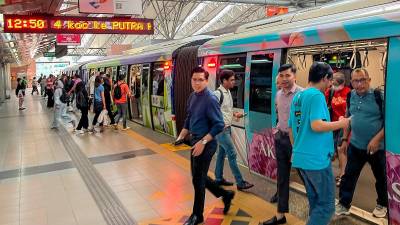PETALING JAYA: Malaysia’s next federal budget should mark a turning point in how the nation measures success in transport, by prioritising journey time, reliability and commuter experience instead of simply funding new infrastructure, says transport policy expert Wan Agyl Wan Hassan.
He said despite years of record spending on urban rail and highways, public transport usage remains well below target – particularly in the Klang Valley, where fewer than one in four trips are made using buses or trains, far short of the 40% goal by 2030.
“The My50 pass (RapidKL’s 30-day unlimited travel pass) has proven that affordability works. More than 2.7 million passes have been sold, and 60% of users are from the B40 group,” he told theSun.
“It remains Malaysia’s most effective cost-of-living policy in transport. But subsidies alone cannot change travel habits if the system remains slow and unreliable.”
Wan Agyl said Budget 2026 must focus on time, not just ticket prices, arguing that the most immediate transformation could come from bus priority measures that improve speed and reliability at a fraction of the cost of rail expansion.
He said for about RM500 million, Malaysia could build 100km of dedicated bus lanes and smart traffic signal systems in key corridors across the Klang Valley, Penang and Johor Bahru.
“Cities like Bogotá and London saw journey times drop by 20% to 30% when buses were given dedicated right-of-way. When buses move faster, the entire system becomes more attractive – rail lines get more feeder passengers, and the My50 pass becomes even more valuable.
“If we truly want people to leave their cars, the bus must finally be faster than traffic. That should be the real ‘wow factor’ of Budget 2026.”
He cautioned that Malaysia cannot “build its way out of congestion” with more flyovers or highways, which only shift bottlenecks elsewhere. Instead, the government should start managing travel demand more effectively through targeted reforms.
Wan Agyl suggested that congestion pricing be introduced gradually – starting with feasibility studies and public education, followed by a pilot in downtown Kuala Lumpur or Bangsar South – but warned against rushing implementation before public transport reliability improves.
“Congestion charges, if introduced prematurely, will only frustrate drivers without changing behaviour. It can only work after people have reliable alternatives.”
He said parking policy reform is also key to addressing urban gridlock, noting that Kuala Lumpur and Petaling Jaya still offer cheap, abundant parking even near rail stations — a practice that encourages car use and undermines public transport ridership.
“Internationally, cities like Seoul and Melbourne reduced traffic by tightening parking supply and channelling parking revenue into public transport upgrades. Malaysia can do the same – fewer parking spaces near transit and better pedestrian access to stations.”
Wan Agyl also urged for employer-based travel management, such as tax incentives for flexible working hours, company carpool schemes and staff subsidies for My50 passes.
“These are inexpensive, high-impact policies that directly reduce peak-hour congestion without adding new roads.”
For Kuala Lumpur, he proposed two practical steps that could ease congestion within two years: introducing peak-hour bus priority corridors to keep buses moving faster than traffic and improving first and last-mile access through shaded walkways, expanded feeder buses and on-demand microtransit within 400m of every rail station.
“If we can do these two things right, commuting times could fall by up to 25%, without spending another billion on new infrastructure.”
Wan Agyl added that Malaysians are not demanding new mega-projects but visible, everyday improvements that make journeys faster and less stressful.
“People don’t need more ribbon-cuttings – they need buses that move, trains that run on time and roads that are safe.
“Budget 2026 should mark a new era for transport priorities – one that values minutes saved over kilometres built.
“If the government can give every Malaysian even just 20 minutes back each day, that would be the most powerful ‘wow factor’ any budget could deliver.”
